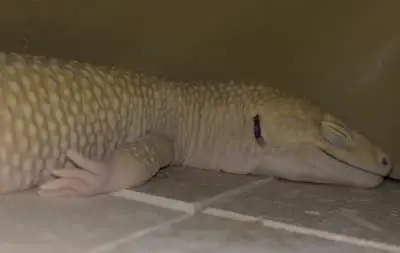Why is My Leopard Gecko Sleeping So Much

Leopard geckos are nocturnal creatures that sleep during the day. They are most active at night, when they hunt for food. So, if you see your leopard gecko sleeping a lot during the day, there’s no need to worry.
It’s just their natural behavior.
There are a few reasons why your leopard gecko may be sleeping more than usual. One possibility is that they are experiencing stress from something in their environment, such as a new pet or loud noises. Leopard geckos are also known to sleep more during periods of shedding their skin.
If you’ve noticed your leopard gecko sleeping more than normal and they don’t seem to be under any sort of stress, it’s likely nothing to worry about.

Credit: www.reddit.com
How Long Should Leopard Geckos Sleep?
Most leopard geckos will sleep an average of 12 to 14 hours a day. Some geckos may sleep more or less depending on their age, health, and activity level. For example, younger geckos tend to sleep more than adults and sick geckos may sleep more than healthy ones.
Geckos that are active during the day often sleep less at night.
Why Does My Leopard Gecko Just Lay Around?
Leopard geckos are a type of lizard that is found in the wild in parts of Asia and Africa. They are a popular pet due to their docile nature and wide variety of color morphs that are available. Leopard geckos typically spend the majority of their time resting or sleeping since they are nocturnal animals.
In the wild, they would only be active at night when it is cooler and there are fewer predators around.As pets, leopard geckos should have an enclosure that provides them with plenty of places to hide and relax during the day. A basking spot should also be provided so they can raise their body temperature if needed.
If your leopard gecko appears to just be laying around all the time, it could be a sign that something is wrong such as not having enough hiding places or being too cold. If you suspect your leopard gecko isn’t feeling well, take them to a reptile vet for an examination.
Do Leopard Geckos Sleep Most of the Day?
Leopard geckos are nocturnal creatures, meaning they sleep during the day and are active at night. While they do spend a good portion of their day sleeping, leopard geckos are not true hibernators and can be awoken fairly easily.
Why is My Leopard Gecko Not Eating And Sleeping a Lot?
If your leopard gecko isn’t eating and sleeping a lot, there could be several reasons why. It might be sick, it might be shedding its skin, or it might just be stressed. If your leopard gecko is sick, take it to the vet right away.
If it’s shedding its skin, make sure it has a warm place to hide and plenty of water. If it’s just stressed, try to figure out what’s causing the stress and remove whatever it is.
What It's Like Owning Geckos Who Sleep ALL DAY 😴
Leopard Gecko Sleeping a Lot Not Eating
If you have a leopard gecko that is sleeping a lot and not eating, it could be a sign of illness. If your gecko is acting lethargic, has lost its appetite, or seems generally unwell, take it to the vet for a check-up. It’s also possible that your gecko is simply going through a growth spurt and needs more rest than usual.
Keep an eye on your pet and consult with your veterinarian if you’re concerned about its health.
Why is My Leopard Gecko Sleeping Out of His Hide
If your leopard gecko is spending more time out in the open and less time hiding away, there could be a few reasons why. Maybe he’s feeling more secure in his environment and feels comfortable exploring his surroundings. Or, it could be a sign that something is wrong and he’s not feeling well.
Whatever the reason, it’s important to keep an eye on your leopard gecko and make sure he’s still eating, drinking, and behaving normally. If you notice any other changes in his behavior or health, please contact your veterinarian right away.
Is My Leopard Gecko Dead Or Hibernating
One of the most common questions we get here at Gecko Time is “Is my leopard gecko dead or just hibernating?” The short answer is that it’s probably hibernating. But before you write off your pet as lost forever, there are a few things you can do to be sure.
First, take a close look at your leopard gecko. If it’s lying completely still and its eyes are closed, it’s probably dead. However, if its eyes are open and it appears to be breathing, there’s a good chance it’s just taking a long nap.
If you want to be absolutely certain, you can try gently prodding your leopard gecko or placing a warm hand on its belly. If it responds by moving or opening its eyes, then congratulations! Your pet is alive and well and simply enjoying a good winter snooze.
Is Sleeping Out of the Hide Normal for Leopard Geckos?
Leopard gecko behavior while sleeping varies, but it is normal for them to sleep out of their hide at times. This behavior can be influenced by factors like temperature, habitat setup, and comfort. While some leopard geckos prefer hiding during sleep, others may feel secure enough to rest out in the open.
Leopard Gecko Sleeping Positions
As leopard geckos are nocturnal lizards, they sleep mostly during the day. When they do snooze, they can often be found in a number of different positions. Some common sleeping positions for leopard geckos include:
On their back: Many leopard geckos will sleep on their backs with all four legs stretched out to the sides. If you see your leopard gecko in this position, it’s a good sign that they’re feeling relaxed and comfortable.Curled up in a ball: Another common position for leopard geckos is to curl up into a tight ball.
This is usually seen as more of a resting position than an actual sleep position, but some leopard geckos will stay like this for long periods of time.Hanging from the ceiling: Leopard geckos are excellent climbers and some of them enjoy sleeping upside down! If you see your leopard gecko hanging from the ceiling or another high surface, don’t worry – they’re just getting some shut-eye.
Conclusion
Leopard geckos are nocturnal creatures, so they sleep during the day. If your leopard gecko is sleeping more than usual, it could be a sign of illness. If you’re concerned about your leopard gecko’s health, take them to the vet for a check-up.